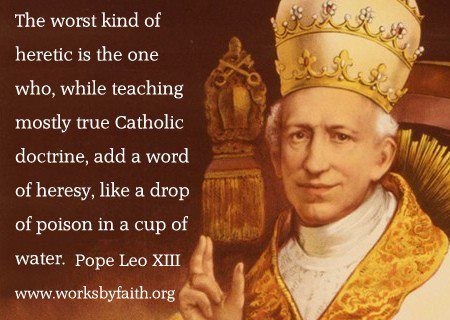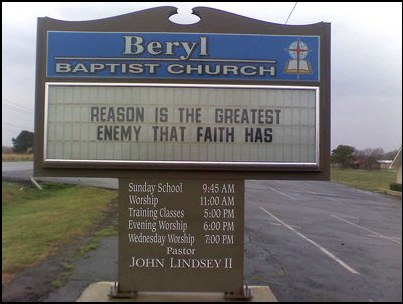
(-such is true of all heresy or sin. There is always a drop of truth mixed in, attraction. That’s the bait. That is the intoxicant and the deceiver. Satan is the Prince of Lies. He always mixes a drop of truth in with the lies. Why else would we believe? If it were ALL lie? We’re not STUPID, you know.
However, if one does not look too closely, you are sure to miss the error. The Great Deceiver is a sly fox. Never underestimate him, or fall for that oldest of canards, that evil does not exist. The Devil loves that one. It’s his favorite. Definitely, an oldie but a BADDIE!!! Look around. Smell the air. Taste the times, and tell me, or much more importantly, yourself, that evil TRULY does not exist? TRULY? Heart of hearts?
That is why we MUST understand our faith, and be able to point out the error, and not merely, passively, succumb to the deception. Christian love is helping our neighbor see and think for themselves, accurately, accurately, truthfully.
“Thinking Catholic” is not an oxymoron. Quite the contrary. Quite. God gave us the gift of intellect. Let us praise Him in the most sincere manner possible, by striving to understand the ineffable; to know and do His will. Like incense rising from the altar of the mind, to the God Who created it!!! 🙂 )
Fideism denies the role of reason in the act of faith. It says human reason has no role in the act of faith. Only faith is involved in the act of faith. This is a heresy for two reasons: 1) It denies the role/competence/ability of unaided human reason to reach certitude, and 2) that the supreme criterion of certitude is authority. Untrue.
Authority, even the authority of God, cannot be the supreme criterion of certitude. Even if God wills it in His supreme Divinity upon a creature supposedly capable of free will, then this willing of God violates the creature’s free will and there is therefore NO free will. It contradicts itself. It is not faith, in that faith is an act of the creature through free will. Feel me?
And, an act of faith cannot be the primary form of knowledge. This authority, indeed, in order to be a motive of assent, must be previously acknowledged as being certainly valid – God has authority. Faith. See the contradiction?
Before we believe in a proposition as revealed by God, we must first know with certitude that God exists. In the absence of the obvious, reason must be used to draw conclusion. Feel me?
We must conclude that He reveals such and such a proposition, i.e. His existence, again, reason.
And, again, that His teaching is worthy of assent. Again, reason.
So fideism contradicts itself all the way down! FEEL ME?
All of these questions can and must be ultimately decided only by an act of intellectual assent based on objective evidence. REASON!!!! Thus, fideism not only denies intellectual knowledge as a source of authority towards certitude, but logically ruins the entire idea of faith itself.
———————
There are “fundamentalist” adherents in every belief system who tend to answer all questions with a reference to an official document. Their faith consists of: “the Powers that Be say so and I believe it because they say so.” Even, maybe especially, Catholics who may embrace this attitude are fideists and, therefore, heretics. Human reason cannot be avoided in the act of faith. It cannot. Fideists can be atheists who believe anything written at Skeptic.com as well as Catholics who’ve memorized the Catechism.
But the Church says that such an attitude is heresy, starting at least as far back as 1348 AD. Unexamined loyalty to the teachings of the Church, only because the Church says so, can indicate an absence of faith.
As it says in the Decree on the Reform of Ecclesiastical Studies:
“…the Church follows … cultural changes at work, which influence both her and society as a whole. Among the changes of the predominant culture, some particularly profound ones regard the concept of truth. … mistrust in the capacity of human intelligence to arrive at objective and universal truth – a truth by which people can give direction to their lives.”
Maybe it easier to see the error of this argument if we look at its inverse. Sometimes this really helps and clarifies intellectual understanding. Fideists’ mistrust is evident in the argument of the atheist that as all the churches don’t agree precisely on Truth, then there is none. The fundamentalist Catholic displays his mistrust openly when states his own judgement is not worthy, and so adopts whatever he reads or is told by authority (Vatican, Bible, CCC, Bishop, Priest) and so becomes a functional atheist himself, as he places his faith in books or people instead of God. In fact, he makes it clear that this mistrust extends to all humans, he defines anyone who begs to differ with his recognized authorities as incontrovertibly wrong.
This issue is of such concern to the Church, that not only does the Decree to Reform increase the the amount of time necessary to study philosophy with an emphasis on metaphysics for an Ecclesiastical program, but states: that:
“An excessive mixing of philosophical and theological subjects … ends up giving the students a defective formation in the respective intellectual “habitus”…. In order to avert the increased risk of fideism, and to avoid either a manipulation or fragmentation of philosophy, it is highly preferable that the philosophy courses be concentrated in the first two years of philosophical-theological formation.”
The Vatican increases the philosophy study from two years to three in a five-year course of study, and wants the bulk of it to happen before any concentration of theology. Yet, the fundamentalist described above is a creation of the Church he grew up in, most often. Historically, the standard form of catechesis for a Catholic child is to teach them the rules first and foremost and to suppress the philosophical questions and ignore spiritual formation. This is oddly and exactly the reverse of what Pope St John Paul II understood was necessary for the true evangelization of the person.
Christian faith is an adult faith. Children can only learn literal yes and no, being so young. The implication is that catechesis is REALLY an adult function, or needs to be, and infantile catechesis may actually be a contradiction in terms, or at least should focus on spiritual formation and philosophical questions so early, and not on the rules, i.e. conclusions of that inquiry. Feel me?
What if, raised without spiritual formation, philosophy or encouragement to trust their own ability to discern, the Catholic thinks, I know the Church should be enough, but it just isn’t. Why don’t I feel anything? Why is the Mass so empty? What’s the point, anyway? Does this make someone a “bad” Catholic, or just caught in the revolving door between fideism and metaphysics. (Hint: pick door #2! 🙂 )
No wonder so many Catholics, when faced with the reality of supernatural grace, of experiencing oneness with God, receiving a vision or gifted by a miracle, find themselves adrift in the midst of their Church. They’ve been taught not to trust themselves, and to, instead, practice fideism. They are often encouraged to ignore or deny their own encounter with the Divine, (“the devil can disguise himself as an angel of light!!” ) and mistrust their own perception of the Love, Joy and ineffable glory associated with their experience. i.e. read Amoris Laetitia
I love the Church so much, I quote here liberally from her documents. I don’t love the Church because the writings give me my faith, but because they validate my own rational conclusions concerning the revelations I receive through my own supernatural experiences. That is, I believe in my own capacity to arrive at objective and universal truth, just as I believe in yours. And it is the Church, the body of two millennia of cumulative understandings of individuals, that confirms those truths which are universal, or sometimes are only personal Spiritual Direction, yet equally truths.
Love, Faith, AND REASON!!!
Matthew


